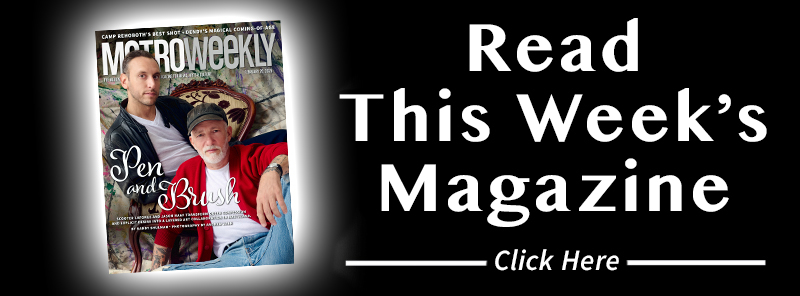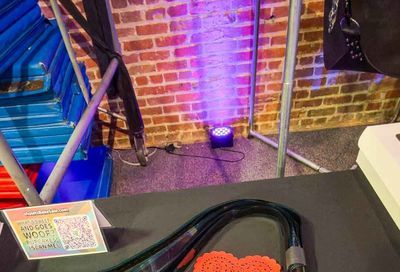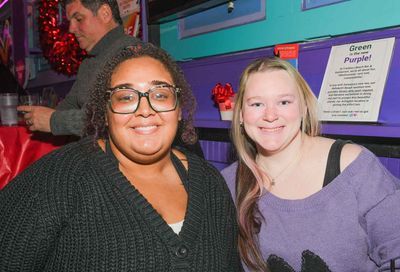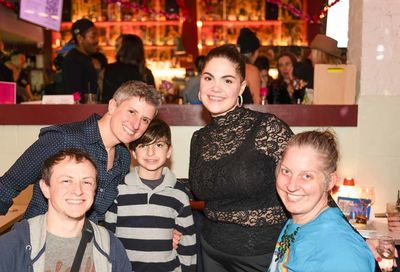DC Eagle closed after months of mismanagement, employees say
DC Eagle employees reflect on the city’s oldest leather bar, and its sudden closure
By John Riley on May 8, 2020 @JRileyMW

When news broke on Tuesday that the DC Eagle was closing, longtime patrons, leather enthusiasts, and casual fans alike took to social media to express their shock, share fond memories, and raise concerns about the future of nightlife in the city.
But for some former employees of the District’s oldest and largest LGBTQ nightclub, the news wasn’t so much a surprise as a disappointment, a result of alleged financial mismanagement and a resistance to changing and adapting with the times.
The closure announcement, made to employees during a Zoom meeting on Monday evening, makes the DC Eagle the second LGBTQ bar in the D.C. area to close in the past week — Ziegfeld’s/Secrets, the Southwest D.C. club that offered live drag and nude male dancers, confirmed last Friday that it would permanently close.
According to one employee, who spoke to Metro Weekly on condition of anonymity in order to talk openly, the DC Eagle’s co-owners Ted Clements and Peter Lloyd are expected to dissolve the business. There are currently no plans to relocate or reopen the bar in another location at this time.
The employee claimed that staff and managers had seen signs that the business was not on strong footing even prior to being forced to close due to the ongoing COVID-19 pandemic, adding, “It’s been a constant struggle to get things done that needed to get done.”
Throughout its 48-year history, the DC Eagle has served as a popular hangout for members of the leather, levi, kink, fetish, and BDSM communities, and more recently had begun reaching out to other non-traditional communities. It also boasted of having the longest-running leather title contest of any bar in the country, even prior to the start of the International Mr. Leather contest.
The bar has relocated and changed ownership many times since first opening in 1971 at 904 9th St. NW, in the city’s Mount Vernon neighborhood. It shifted every couple of years, relocating to 950 9th St. NW, then to 925 5th St. NW, and finally 639 New York Ave. NW, where it remained for 26 years, from 1987 to 2013. In 2014, the club relocated to its current location at 3701 Benning Rd. NE, opening the doors of its newly renovated warehouse in early 2015.
Due to its resilience and the persistence of its various owners to keep the DC Eagle brand alive, the frequent moves gave the club an air of indestructibility among some of its most loyal customers and staff.
But the Eagle employee said that, over time, concerns about the bar’s financial stability began to develop, especially after the building was sold to Estervera LLC in June 2019 for $1.5 million. The club’s owners told local media that they had sold the property to generate revenue with the intent of leasing the building from a new owner in order to continue operations.
That sale occurred less than a year after the D.C. Office of Tax and Revenue sold the option to buy the Eagle’s building because the Eagle owed close to $32,000 in overdue property taxes for the period from 2016 to 2018.
Under D.C. law, owners whose properties are sold at a tax sale can stop the purchaser from taking over the property by paying back the overdue taxes, plus fees and penalties, in full before the last day of the sale. Records from the Office of Tax and Revenue show that a payment of $25,000 was made in October 2018, and another payment of $49,000 was made in June 2019, the same month it was sold to Estervera LLC.
Nine months later, on April 3, 2020, the building was sold again, this time to Benning Rock, LLC for $3 million, according to the D.C. Office of Tax and Revenue.
The Eagle employee claimed that, prior to the Benning Rock sale, Clements had not paid rent on the property “in a long time,” enough for Estervera to “exercise a part in the lease that says you’ve broken the lease and [Estervera is] able to get out of the lease agreement.” As such, when the building was sold, Benning Rock “was purchasing it with a tenant who was moving out,” the employee said.
The employee said that Benning Rock plans to take control of the building in September. In February, the Washington Informer reported that a company named CORE, LLC planned to install a 300-bed halfway house in the Eagle building, under a contract with the U.S. Federal Bureau of Prisons. That report sparked opposition from Councilmember Vincent Gray (D-Ward 7), who represents the area around the club, but appeared to confirm rumors that had been circulating throughout the LGBTQ community for months, Eagle employees say.
A second former Eagle employee, also speaking on condition of anonymity for fear of backlash from the owners and former colleagues, told Metro Weekly that, like his co-worker, he casts much of the blame for the Eagle’s woes on Clements, whom he accused of financial mismanagement. He also alleged that there was seldom documentation of how much money was on hand at any given time.
“Ted refused to have any daily reconciliation. There was no form of cash management,” he said. “When we installed the Square register systems [to accept card payments], he refused to use them. He made people pay cash when he was bartending by himself. And there’d be one or two drinks sold each night, and it wouldn’t line up with what other employees would have rang in his place. There was zero accountability or oversight.”
The second employee also noted that some workers would often be advised to wait before cashing their payroll checks.
“We’d actually have payroll checks bounce a couple of times, because money would get shuffled around, or bills wouldn’t get paid properly,” he said. “I had three consecutive paychecks bounce, and didn’t get paid one check until six months after I left.”

The former employee also alleged that, between the old location on New York Avenue and the relocation to Northeast D.C., Clements had overpaid the electric bill by five figures because he would “round up” the amount owed. As a result, it took months for PEPCO’s legal team to apply the overpayment as a credit to the Eagle’s account, the employee claimed.
Christopher Paul Garrett, a former manager at the DC Eagle for more than two years, says its closure wasn’t surprising, particularly after reading about the building’s sale last year.
“I can completely and happily confirm that it was definitely a struggle to get things done. When I started, I was shocked and appalled that they did not have a cash management system installed.”
Garrett says he wasn’t privy to certain details of the business, such as its bills, but that many of the criticisms lodged by Metro Weekly’s sources resonate with him, adding that some of the alleged actions would not be “out of character” in terms of how the bar was run.
“[The owners] simply didn’t share information about certain parts of the business if it wasn’t pertinent to my job,” he says. “Unless it was something I directly needed to know to make the building run during the day, they really didn’t share that information with me.
“I can completely and happily confirm that it was definitely a struggle to get things done,” he says. “When I started, I was shocked and appalled that they did not have a cash management system installed. I was one of the reasons they adopted Square. I had worked with many different types of computer electronic systems at restaurants in the past, I had helped program them. I actually suggested Micros to them, and they went with Square because it was a cheaper option. But they did not start proper management of the cash and stuff until Square was able to give them a daily report of what was happening.”
Garrett says Clements was resistant to using the new technology, something he chalked up to a generational divide and technophobia. As to claims that Clements had overpaid his electricity bills to PEPCO, Garrett said he had no information on that, but saw “a lot of unopened PEPCO mail.”

Regarding the overdue back taxes, the second anonymous employee claims he was in the room when co-owner Lloyd was attempting to teach Clements about the MyTax DC system, which requires business owners to pay their taxes online. The employee claims this is what led to staff at the Eagle learning from outside sources that the building had been sold in the tax sale in 2018.
“Peter was trying to go over with Ted, ‘Hey, here is how you sign into MyTax DC, the system is changing, you have to do it online, you can no longer mail them a check,’ and walked Ted through the whole process of doing that at least twice,” the employee said. “And it came out a few months later that he had been sending them checks, and of course, they’re not cashing them, because they weren’t accepting mail-in cash payments.”
Lastly, the employee alleged, Clements was stubborn and didn’t want to adapt or cater to new customers beyond the traditional leather community, even though the parties or “raves” that the club would occasionally hold were quite profitable. He was also initially resistant to bringing in drag shows, but later relented.
“He’d say, ‘That’s not our core customer,'” the employee claimed.
The employee also accused Clements of intimidating staffers who spoke up or attempted to introduce changes, and said that, due to his minority share in the business, Lloyd was unable to rein in Clements.
“Ted very regularly would say, ‘I’m running this company. This is how it is,'” the employee said. “Anytime you’d try to challenge him, it was like working for a miniature Donald Trump. He’d try to turn everybody against you. And he was better friends with a lot of the leather clubs and people in the scene, and he’d try to use that influence to throw you under the bus.”
Garrett confirms that Clements was resistant to some of the changes that managers wanted to introduce to adapt to changes in the bar industry.
“Ted was always the stern father energy of the group. And Peter was the maternal, loving energy,” says Garrett. “If you wanted to complain about something or had concerns about the job, you took it to Peter, not to Ted. That was just common knowledge.
“Ted could be reasonable, but you had to try really, really hard to make him listen. Once he was listening, he used logic. But Ted was not easy to communicate with. I think it’s just his personality style.”
A message left with Clements seeking comment was not returned, while an attorney for Clements declined to comment on the employees’ allegations. An attorney for Peter Lloyd also declined to comment. (The Eagle’s full list of creditors, of whom Metro Weekly is one, is unknown at this time.)

Although the Eagle’s current employees — which number 25, including part-time contractors like DJs and drag performers — received paychecks, courtesy of the Small Business Administration’s Paycheck Protection Program, many will now have to seek out other work, a manager told Metro Weekly. Since closing, the Eagle has held online fundraisers for individual staffers, and posted links on its website to people’s Venmo, CashApp, and PayPal accounts so patrons could financially support their favorite bartenders, DJs, or other performers while the club was out of commission.
But the first employee we spoke to was concerned for communities that had established the DC Eagle as their go-to place — from the puppy community to the rave community to drag queens — and questions whether they will be able to find a similar space.
“I’m happy to have been a part of it, but I worry what this means for different segments of our community,” the employee said. “There are countless numbers of people who came to the bar on a regular basis, because, to them, it was the only bar where they could be themselves. It was a bar where they could express their individuality, and it was a second family — and sometimes even a first family — for many people. They’re now going to be stuck finding out where they can enjoy themselves and be themselves.”
Garrett echoed those sentiments, noting that the DC Eagle was his first foray into the leather community.
“I was not part of the leather community at all. I went to the old Eagle maybe a total of three times,” he says. “When I started working there, I was shocked and amazed at how I was welcomed. There were different aspects of that world, and now the city is going to be without, because those scenes don’t necessarily have a home. It’s sad that the younger generation will miss out on things we had.”
Garrett adds that he mostly had positive experiences during his time at the bar.
“Up until the point where I was let go” — for reasons that were untrue, he claims — “it was a dream job. I wasn’t being paid nearly what I should have been. But I got to do the things I never would have dreamed of.
“I let go of religion years ago. I worship DJs now,” he adds. “I got to work with my idols, like DJ Abel and Tracy Young, and those people know my first name, and that’s because of the Eagle. The club became a family to me. I was challenged the way I never had been before in other jobs, and I was able to rise to those challenges.”
Other former employees say the Eagle was a place where they felt accepted and appreciated.
Alex Gomez, who moved up the ranks from barback to bartender, says he was “heartbroken” at hearing the news of the Eagle’s closure.
“The Eagle is a very special place to me. It’s the first place that offered me a job as a bartender when I was in school. I experienced very many sexual ‘firsts,’ and very many other types of ‘firsts’ in my queer experience,” he says. “I loved it so much that I wanted to work at it.”
Gomez noted that there had been rumors that the club was going to close that would frequently circulate, only to be shut down or dispelled by management.
“I think everybody knew that the Eagle was having a hard time financially. Though to be honest, I don’t know what the financial situation was,” he says. “I still got paid every time my paycheck came around.”
In fact, Gomez says, he began to see the Eagle as a sort of resilient figure in his life that could weather any trouble.
“It always seemed like regardless of the issues it went through, it kind of stood the test of time, through a lot of different hardships, and I’m not going to lie, I thought this pandemic was going to be one of those hardships that it would outlast,” he says. “I guess it was just its time.”
Gomez never experienced any problems with his immediate supervisors or managers. He had heard rumors about problems with higher-level management, but dismissed any rumblings of discontent as just “gay boy drama.” He feels there is going to be a significant “gap” in the queer nightlife community that the Eagle would have normally filled had it remained open.
“I think people who appreciate kink and fetish and sex positivity are going to sorely miss a space where they were able to practice and promote that,” he says. “That’s just not available at other bars in the city.”
“The Eagle was a place where you could let your freak flag fly. You could really be just who you were, whether you were into heavy S&M or were just someone who liked the look of a leather vest. To me, it’s devastating.”
Jon Rybka, the lead bartender at the DC Eagle on Friday and Saturday nights, knew there had been discord between the owners individually, as well as between some of the staff members and the owners, but still didn’t expect the club to close as suddenly as it did, believing the Eagle would survive as it had previously during other times of hardship.
“I was in shock,” he says. “I was really sad, because it’s a second family to me. I was just kind of gutted. It’s the end of a legacy.”
While Rybka knows some of his former co-workers will complain about the negative experiences they had, he tries to take a positive view of his time at the club.
“There’s so much negativity in the world, and so much bullshit and hatred and anger and infighting, that I choose not to be a part of it, because I want everybody to be happy. My fellow workers became like kids to me. They called me ‘Mama Shelby,’ because I watched over them and made sure everybody was happy, and was always an ear to listen to. And I was that middle person that could go to management and say, ‘Look, this person’s unhappy’ or ‘What are we going to do about this?’ For better or worse, it was my family.”
Rybka is not sure that any other bar or nightclub will be able to fill the niche that the DC Eagle did.
“The Eagle was a place where you could let your freak flag fly,” he says. “You could really be just who you were, and what you wanted to be, whether you were into heavy S&M or were just someone who liked the look of a leather vest, or if you liked to dance and party, you could do that, too. To me, it’s devastating.”
Brooklyn Heights, a drag queen who had hosted shows and a weekly viewing of RuPaul’s Drag Race at the DC Eagle every Friday, says employees had suspected that the bar might close, but didn’t know when it would actually occur.
“The Eagle is not in the inner city of D.C., so it’s a hike to get over there,” Heights says. “Attendance would be low some weeks. As far as warning signs for management, everyone has their bickers now and then, but there was nothing where we said, ‘Oh, we’re going to close because so-and-so are fighting,’ or anything like that.”
She says she and the other drag queens never had issues getting paid on time, and that even though there were rumors of a pending closure, there was nothing she saw personally indicating that the club was in dire financial straits.
Heights says regular patrons of the DC Eagle have reached out to her and tried to support her financially and make sure she’s doing well — something she says is a sign of a strong LGBTQ community. However, she doesn’t know where she’ll end up performing once people stop social distancing due to the COVID-19 pandemic.
“I’ve done drag for almost eight years, and I do it six days a week,” she says. “Brooklyn will still be around, it’s just ‘Where is she going to be Friday nights?’ will be the question now. There just aren’t many places these days.”
Even though more LGBTQ bars appear to be closing up shop locally, Heights believes there’s still a need for queer-only spaces.
“There need to be gay bars,” she says. “You can’t do everything on social media. As far as meeting people and having a face-to-face experience, I think they’re needed.
“I think the biggest thing we need to do is support our local venues,” she continues. “Obviously, you can watch drag on television now, that’s become mainstream. But people need to leave their houses, support their local bars, and eat at the places that offer food. If you can drive 30 minutes to a hook-up, you can travel 15 minutes to a venue and support them.”
Related:
Ziegfeld’s/Secrets nightclub is permanently closed, owners confirm to Metro Weekly
Closing Calls: D.C.’s LGBTQ bars and restaurants respond to coronavirus
Read more:
Amid coronavirus pandemic, gay New Yorkers slammed for attending ‘Rona Rave’ house party
Transgender woman stabbed to death in Missouri
Anti-LGBTQ Trump ally calls gay marriages ‘counterfeit,’ blames them for decline in marriage rates
More from Metro Weekly:
5 Takeaways from New Survey on LGBTQ Life Under Trump
An HRC survey finds declining acceptance, growing insecurity, and widening barriers to work, food, and health care for LGBTQ Americans.
By John Riley on January 16, 2026 @JRileyMW
A new report finds that acceptance of LGBTQ people is declining across the United States, with nearly three in ten LGBTQ adults saying attitudes toward their community have worsened.
On Thursday, January 15, the Human Rights Campaign Foundation released findings from its Annual LGBTQ+ Community Survey, which drew responses from nearly 15,000 U.S. adults -- roughly two-thirds of whom identified as LGBTQ.
In addition to the survey, HRC last year launched its "American Dreams Tour," traveling to 10 cities and engaging more than 5,000 people through town halls, trainings, and community meetings with local LGBTQ leaders and activists. Those on-the-ground conversations informed the report, which aims to assess the state of LGBTQ life in the United States one year into the second Trump administration.
Man Slashed on NYC Subway for Kissing Trans Partner
The 28-year-old victim was treated at Bellevue Hospital as the NYPD Hate Crimes Task Force joined the search for the unidentified assailant.
By John Riley on January 20, 2026 @JRileyMW
A New York City subway rider was slashed in the face earlier this month by an unidentified assailant who took offense to him kissing his transgender partner. The attack occurred around 7:50 p.m. on January 10 aboard a southbound No. 6 train as it traveled through Manhattan.
According to police, the 28-year-old victim was kissing his partner when the suspect began shouting anti-gay slurs. The verbal abuse quickly escalated into a physical confrontation. During the argument, the suspect struck the victim with a sharp object, causing a deep laceration on the right side of his face, according to New York CW affiliate WPIX.
Hockey Player Says ‘Heated Rivalry’ Inspired Him to Come Out
After years of playing while closeted, Jesse Kortuem says the HBO series Heated Rivalry helped him finally reconcile his identity with the sport he loves.
By John Riley on January 19, 2026 @JRileyMW
Jesse Kortuem, a hockey player who has competed in several adult leagues but never at the professional level, says he was inspired to come out after watching HBO's Heated Rivalry, a romance centered on closeted gay hockey players.
In a Facebook post, Kortuem recalled growing up in Minnesota as the youngest of four boys and playing hockey from a young age, while struggling to reconcile his love for the sport with his sexuality.
"To any hockey player, the sounds of the rink and the feel of cold air are unmistakable. The slapshots, the pucks hitting the boards, the skates carving fresh ice, and the high-pitched clang of a puck hitting the post bring immense comfort," Kortuem wrote. "For a long time, however, the rink did not feel like a place where I could be all of me. I felt I had to hide parts of myself for far too long."
Support Metro Weekly’s Journalism
These are challenging times for news organizations. And yet it’s crucial we stay active and provide vital resources and information to both our local readers and the world. So won’t you please take a moment and consider supporting Metro Weekly with a membership? For as little as $5 a month, you can help ensure Metro Weekly magazine and MetroWeekly.com remain free, viable resources as we provide the best, most diverse, culturally-resonant LGBTQ coverage in both the D.C. region and around the world. Memberships come with exclusive perks and discounts, your own personal digital delivery of each week’s magazine (and an archive), access to our Member's Lounge when it launches this fall, and exclusive members-only items like Metro Weekly Membership Mugs and Tote Bags! Check out all our membership levels here and please join us today!
The Magazine
-
Most Popular
 Montgomery County Ordered to Pay $1.5M in LGBTQ Books Case
Montgomery County Ordered to Pay $1.5M in LGBTQ Books Case  Shia LaBeouf Arrested After Alleged Anti-Gay Rant
Shia LaBeouf Arrested After Alleged Anti-Gay Rant  Murder in Glitterball City Gets Lost in Its Own Myth
Murder in Glitterball City Gets Lost in Its Own Myth  Same-Sex Marriages Could Be Ignored Under Tennessee Bill
Same-Sex Marriages Could Be Ignored Under Tennessee Bill  Bill Irwin’s On Beckett Is an Exhilarating Triumph
Bill Irwin’s On Beckett Is an Exhilarating Triumph  7 Suspected of Pornographic, Anti-LGBTQ Graffiti at Stadium
7 Suspected of Pornographic, Anti-LGBTQ Graffiti at Stadium  Hockey Star Hilary Knight's Olympic "Storybook Ending"
Hockey Star Hilary Knight's Olympic "Storybook Ending"  Dendy’s Nothing Up My Sleeve Casts a Mesmerizing Spell
Dendy’s Nothing Up My Sleeve Casts a Mesmerizing Spell  Gay Former U.K. Ambassador to U.S. Arrested Over Epstein Ties
Gay Former U.K. Ambassador to U.S. Arrested Over Epstein Ties  Gay French Ice Dancer at Center of Olympic Judging Controversy
Gay French Ice Dancer at Center of Olympic Judging Controversy
 Dendy’s Nothing Up My Sleeve Casts a Mesmerizing Spell
Dendy’s Nothing Up My Sleeve Casts a Mesmerizing Spell  Bill Irwin’s On Beckett Is an Exhilarating Triumph
Bill Irwin’s On Beckett Is an Exhilarating Triumph  Murder in Glitterball City Gets Lost in Its Own Myth
Murder in Glitterball City Gets Lost in Its Own Myth  Montgomery County Ordered to Pay $1.5M in LGBTQ Books Case
Montgomery County Ordered to Pay $1.5M in LGBTQ Books Case  7 Suspected of Pornographic, Anti-LGBTQ Graffiti at Stadium
7 Suspected of Pornographic, Anti-LGBTQ Graffiti at Stadium  GoFundMe Launched to Monitor Stonewall Flagpole in New York
GoFundMe Launched to Monitor Stonewall Flagpole in New York  Same-Sex Marriages Could Be Ignored Under Tennessee Bill
Same-Sex Marriages Could Be Ignored Under Tennessee Bill  Gay Former U.K. Ambassador to U.S. Arrested Over Epstein Ties
Gay Former U.K. Ambassador to U.S. Arrested Over Epstein Ties  Shia LaBeouf Arrested After Alleged Anti-Gay Rant
Shia LaBeouf Arrested After Alleged Anti-Gay Rant  Hockey Star Hilary Knight's Olympic "Storybook Ending"
Hockey Star Hilary Knight's Olympic "Storybook Ending"
Scene
Metro Weekly
Washington's LGBTQ Magazine
P.O. Box 11559
Washington, DC 20008 (202) 527-9624
About Us pageFollow Us:
· Facebook
· Twitter
· Flipboard
· YouTube
· Instagram
· RSS News | RSS SceneArchives
Copyright ©2025 Jansi LLC.














You must be logged in to post a comment.